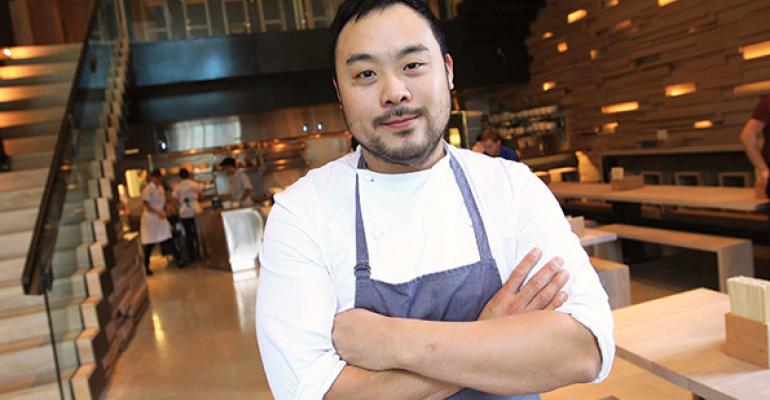When Edward Lee announced his intention to become a professional chef, his father stopped speaking to him. The silence lasted for five long years. Dutiful Korean-American sons became lawyers, perhaps, or accountants, Lee says, but they didn’t work in kitchens. He suggests that the strength of character required to overcome such strenuous parental censure translates directly to the toughness needed to run a top-flight restaurant kitchen and accounts at least in part for the unprecedented wave of Korean-American chefs who are shaking up the domestic dining scene.
The chefs in question, as Lee notes, are roughly his contemporaries in age, mid-30s to mid-40s. They’ve worked in and run some of the very best kitchens in the country, like The French Laundry, Per Se and Charlie Trotter’s, where they’ve combined classic technique with Asian flavor sensibilities. And the number of these chefs who are women is also remarkable and without precedent. As a group, they’ve been busily racking up Michelin stars and James Beard awards.

• Edward Lee himself runs the highly regarded 610 Magnolia and MilkWood in Louisville, Ky.
• David Chang in New York City is building an empire around his flagship Momofuku Noodle Bar.
• Corey Lee’s Benu is viewed by many as the best fine-dining operation in San Francisco.
• Bill Kim has taken Chicago by storm with Urbanbelly and its sibling concepts…
• …while nearby, Edward Kim, no relation, wins accolades for Ruxbin and Mott Street.
• Roy Choi started the food-truck revolution in Los Angeles and plans to upend conventional quick-service with his new Loc’l concept.
The women are every bit as accomplished. Rachel Yang is chef-owner of three trendy and topflight restaurants in Seattle. Beverly Kim, who runs Parachute in Chicago, and Kristen Kish, former chef de cuisine at Boston’s Menton, were formidable Top Chef competitors, with Kish winning the top spot in season 10. Jiyeon “Jiji” Lee was a major recording star in South Korea before finding her way to Atlanta; after stints in fine-dining restaurants, she began dishing up what many consider the best southern-style barbecue in town.
It’s quite a roster of high-wattage culinary stars, and while Edward Lee’s insights regarding the importance of mental stamina ring true, it’s only part of the reason for the rapid ascendance of Korean-inflected cuisine.
These chefs are all part of Generation X, the cohort between the ages of 35 and 51, who came of age concurrent with the culinary revolution that made the restaurant kitchen an attractive and viable career path in this country. The Food Network launched in 1993, the same year that the Culinary Institute of America began offering bachelor’s degrees; together they represented a killer combination that at once engaged the American public and altered their perception of professional cookery. Indeed, Roy Choi talks about how, as an aimless 20-something, he discovered “Essence of Emeril,” chef Emeril Lagasse’s first series on the Food Network, and how it literally changed his life, gave him focus and ultimately led to his enrollment in the CIA. So while there’s no question that the extraordinary rise of Korean-American chefs reflects a necessary amalgam of talent and drive, it’s also true that timing played an equally critical role.
It’s worth noting that both Edward Lee and Rachel Yang were featured at the most recent Worlds of Flavor International Conference & Festival, which is presented annually by the CIA at its Napa Valley campus. This year’s confab, titled “Asia and the Theater of World Menus,” gave attendees an up-close-and-personal look at the panoply of foods and flavors from the East.
Over time, this conference has grown into one of the most reliable leading indicators of menu trends in the restaurant business. In fact, regular attendees were clued into the rise of Korean cuisine years ago, when in 2007, David Chang took part in an Asian Flavor Watch panel discussion and leading practitioners of Korean cookery were featured on the main stage. And Roy Choi made an appearance in 2009, less than a year after he launched his first Kogi Truck, which started a food-truck revolution and made kimchi a menu must-have from coast to coast.
Nancy Kruse, president of the Kruse Company, is a menu trends analyst based in Atlanta. As one of LinkedIn’s Top 100 Influencers in the US, she blogs regularly on food-related subjects on the Linked In website.





